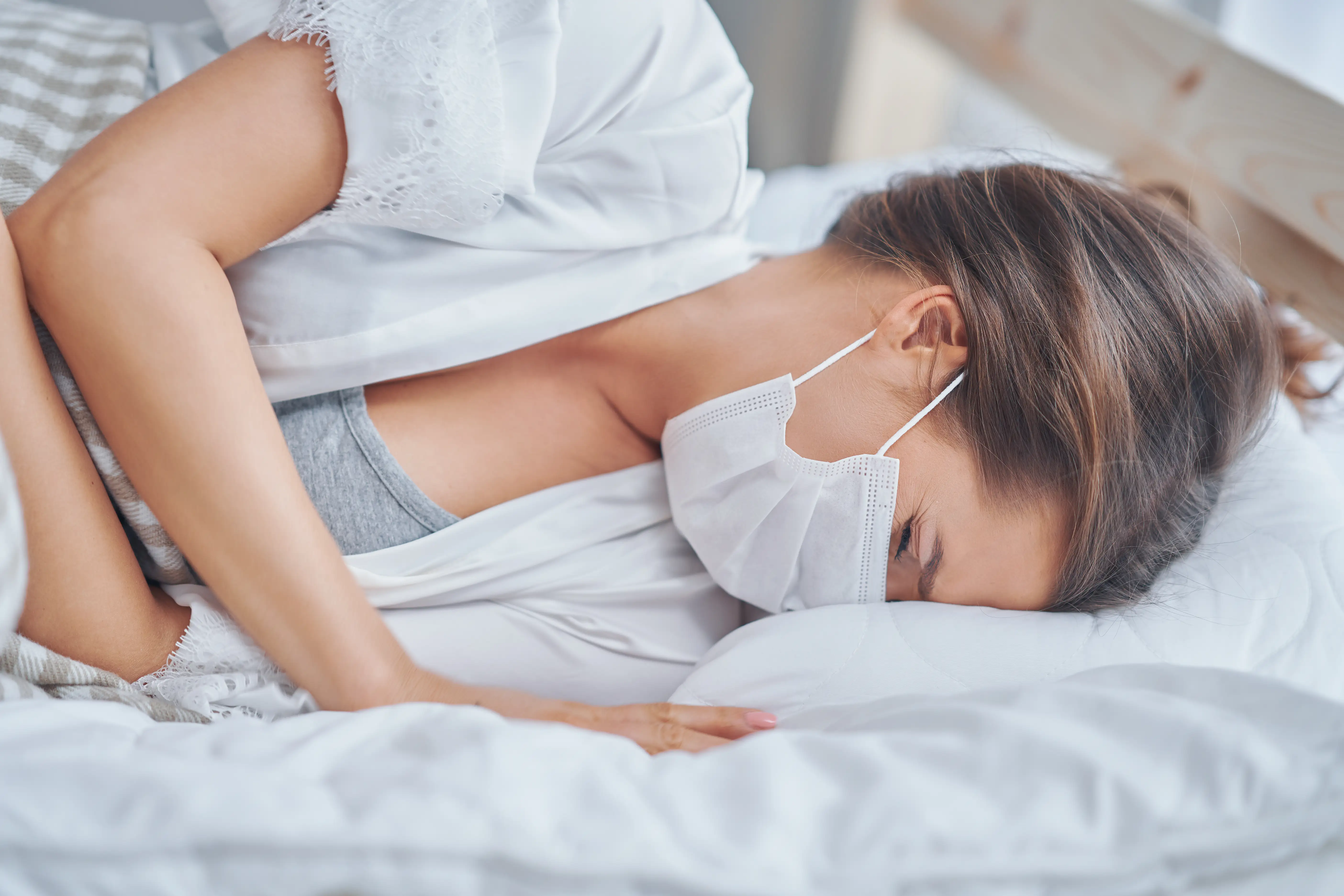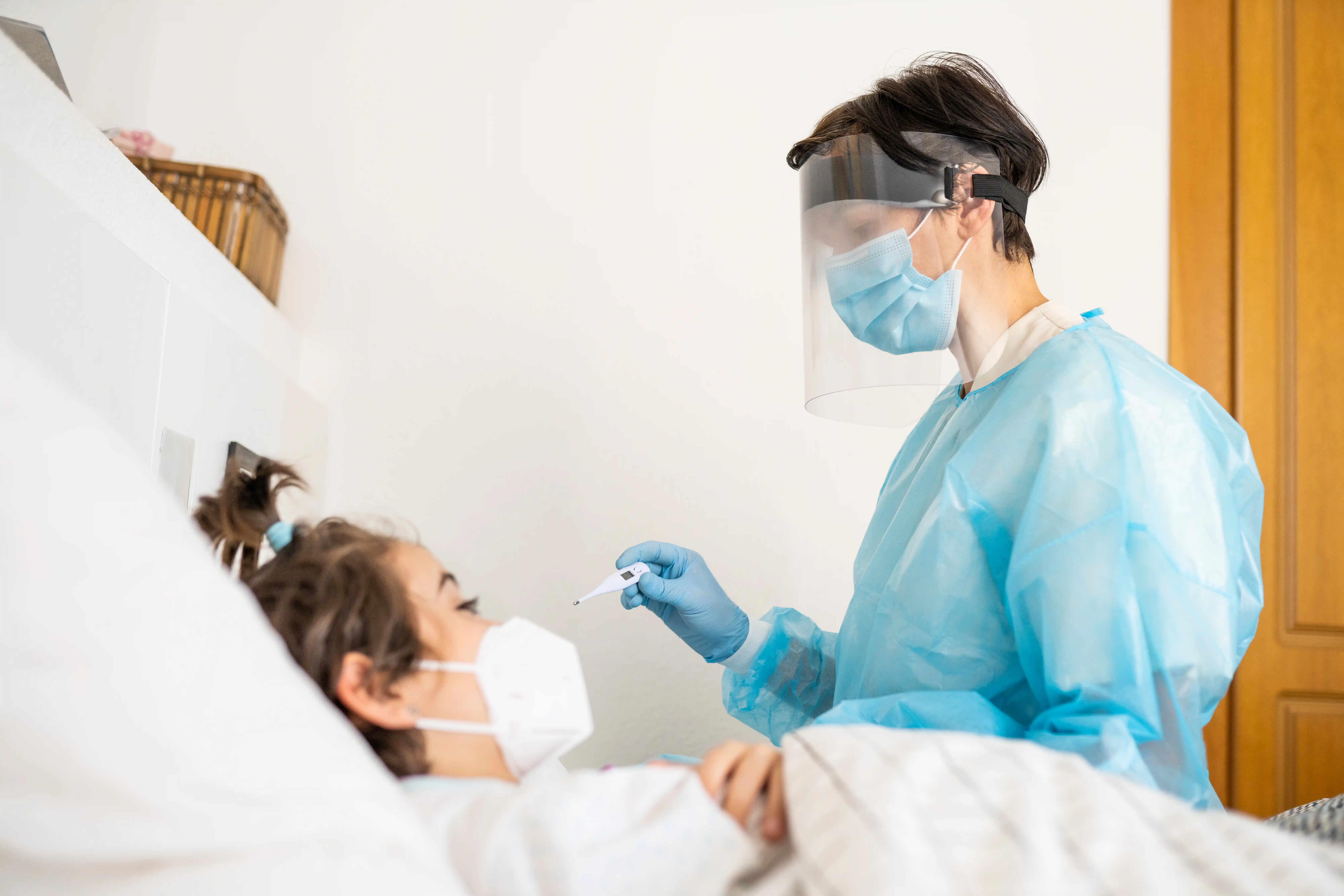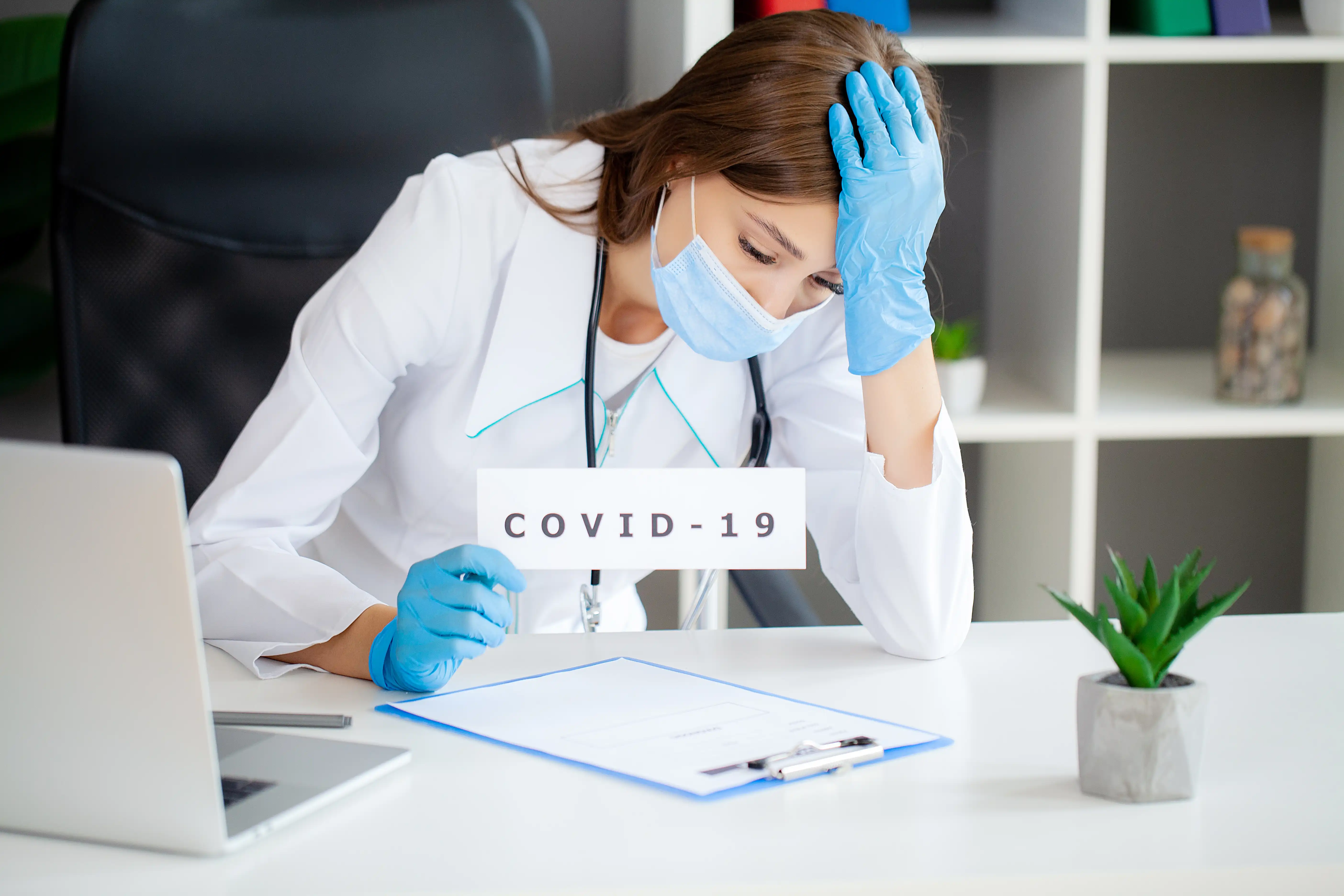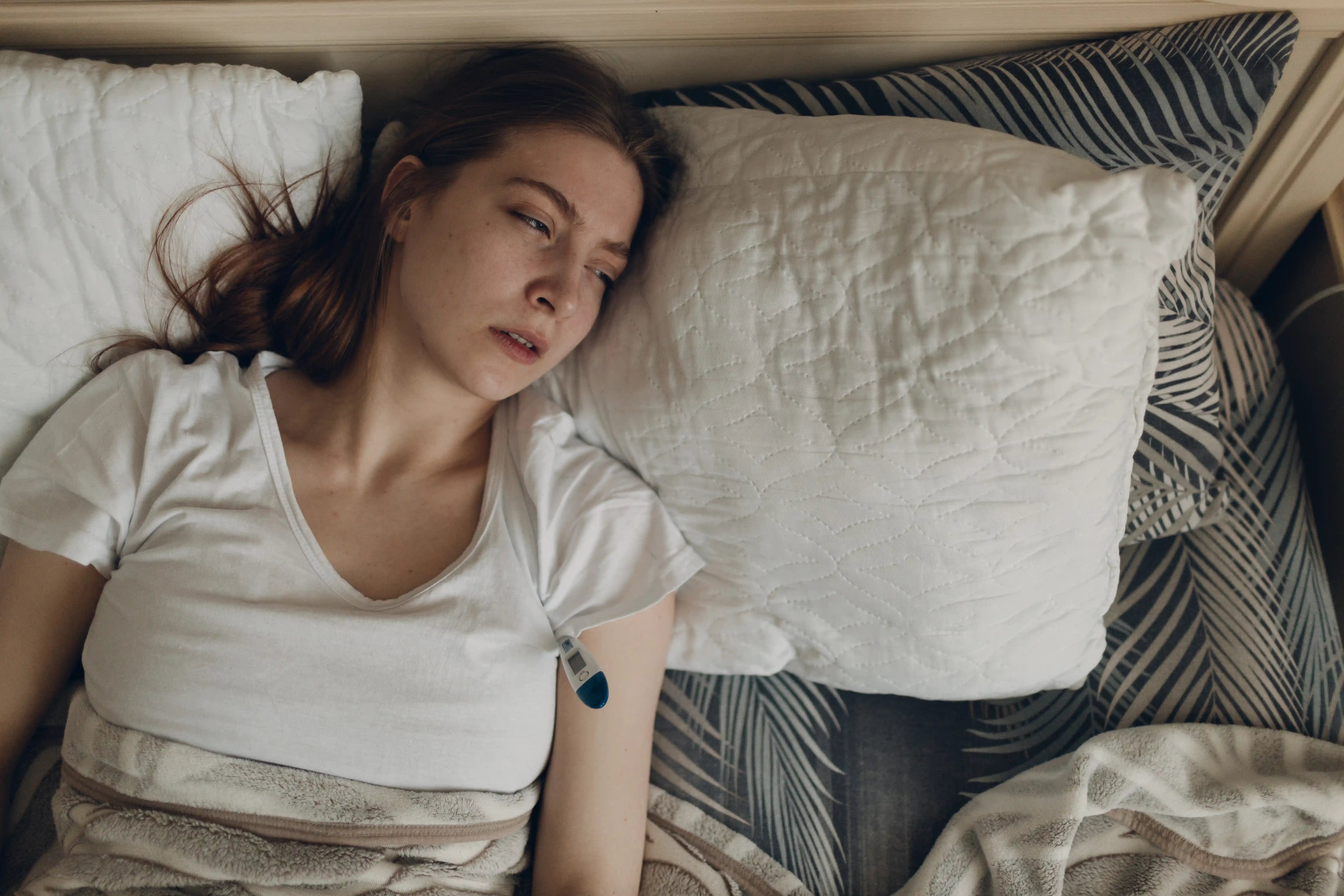Since the start of the COVID-19 pandemic, more attention has been given to how pre-existing health issues might affect a person’s recovery and risk level. One of those issues is sleep apnea, a condition that interferes with breathing during sleep and is often tied to heart and metabolic problems. Because both sleep apnea and COVID-19 affect the lungs and airways, looking at how they interact has become essential.
This article takes a closer look at what happens when sleep apnea and COVID-19 overlap. It covers how the virus may make symptoms worse, what treatments or steps can help, and what to know about using CPAP machines during infection or recovery. There’s also a focus on long COVID and how to stay safer if you live with sleep apnea.
What Is Sleep Apnea?
Sleep apnea is a sleep-related breathing disorder that makes people stop breathing on and off while they sleep. The most common kind, called obstructive sleep apnea (OSA), happens when muscles in the throat block the airway. There’s another kind, central sleep apnea, where the brain doesn’t tell the body to breathe right.
People who have it often snore loudly, feel worn out when they wake up, or go through the day in a fog. Morning headaches and trouble staying focused are pretty common, too.
If nothing is done about it, the condition can raise the chances of heart problems, high blood pressure, strokes, or blood sugar issues. Getting tested usually involves a sleep study, and treatment might include using a CPAP machine, wearing a mouthpiece, or making some lifestyle changes.
What Is COVID?
COVID-19 comes from the SARS-CoV-2 virus, which showed up back in 2019. It spreads through tiny droplets in the air, mostly when someone talks, coughs, or sneezes. For some people, it feels like a mild cold. For others, it can lead to serious problems, things like pneumonia, trouble breathing, or even organ damage.
Common signs of infection include fever, cough, shortness of breath, fatigue, and a loss of taste or smell. For people who already have conditions like sleep apnea, COVID-19 can make breathing problems worse. In some cases, symptoms persist long after the infection has cleared. This is known as long COVID and may include symptoms such as tiredness, mental fog, and sleep disturbances.
How COVID Affects People With Sleep Apnea

COVID-19 and sleep apnea both interfere with normal breathing, though they do so in different ways. When they occur together, they can place added strain on the body, particularly on the lungs, the heart, and the brain. For people who have untreated sleep apnea, a COVID infection (even a mild one) may carry a greater risk of complications.
The Overlap in Symptoms
Both COVID and sleep apnea affect systems responsible for breathing, sleep regulation, and cardiovascular health. When someone is dealing with both conditions, symptoms may overlap or become more difficult to manage. Here are the most important overlapping symptoms to watch for:
- Hypoxemia: Each condition can reduce oxygen in the blood. In obstructive sleep apnea, the airway closes off repeatedly during the night. With COVID, the lungs struggle to move air properly. Together, this can cause oxygen levels to drop to dangerous levels, especially overnight or during illness.
- Sleep Disruption: Sleep apnea causes repeated pauses in breathing that break up normal sleep. On top of that, COVID can bring its own set of problems, things like fevers, discomfort, and insomnia. Even after the infection passes, some people still struggle to get deep, restful sleep.
- Cardiovascular Risk: People with sleep apnea already face a higher risk of heart problems like high blood pressure and stroke. COVID can make things worse by causing inflammation and raising the likelihood of blood clots. When both are present, the heart may have to work even harder than usual, adding more stress to the body.
Why Sleep Apnea May Worsen COVID
Sleep apnea doesn’t make someone more likely to catch COVID, but it can change how their body handles it. If breathing is already off at night, getting a virus that targets the lungs only makes things tougher. The body has to fight harder just to keep up. Here are some key reasons why sleep apnea might make COVID-19 more severe:
- Inflammation: People with sleep apnea usually have some level of inflammation already. CRP and IL-6, which are markers doctors watch, tend to be higher. COVID can make that worse. In some cases, the immune system goes too far, causing damage instead of helping. When both are happening at the same time, the stress adds up.
- Lower Oxygen at Night: People with sleep apnea often experience low oxygen during sleep. If COVID is added, breathing may become even more strained. The body has to work harder, not just at night, but sometimes even with basic activity during the day.
- Shared Risk Factors: Sleep apnea doesn’t show up alone. A lot of people who have it also deal with things like being overweight, high blood pressure, or diabetes. All of these make COVID hit harder. When they overlap, it usually means a slower bounce-back and a bigger risk of serious illness.
Can Sleep Apnea and COVID Affect Each Other?
Sleep apnea does not cause COVID, and COVID does not directly cause sleep apnea. However, the two can influence each other in subtle ways, especially when sleep apnea is untreated or COVID symptoms continue for weeks. The connection can go in both directions.
Does Sleep Apnea Raise Your Risk of Getting COVID?
Sleep apnea does not increase the chance of catching the virus. Infection still happens through exposure, like it does for everyone. But if sleep apnea is unmanaged, it can put extra stress on the body and make it harder to handle illness.
Here are some factors related to sleep apnea that might indirectly affect your body's response to COVID:
- Infection Risk: Sleep apnea does not raise the odds of infection on its own. But poor sleep from untreated sleep apnea can weaken immune defenses, making it easier for the body to get sick when exposed to a virus.
- Immune Weakness: Ongoing sleep disruption and lower oxygen levels can reduce how well the immune system functions. That can make it harder to recover from illnesses like COVID.
- Chronic Conditions: People with sleep apnea often deal with other health problems like obesity, high blood pressure, or diabetes. These can make COVID harder to manage and slow the healing process.
- CPAP Hygiene: A Continuous Positive Airway Pressure (CPAP) machine that is not cleaned properly does not increase the chance of getting COVID. However, poor maintenance can lead to bacterial buildup, which might cause irritation or make breathing more difficult during illness.
Can COVID Make Sleep Apnea Worse or Cause It?
COVID does not directly cause sleep apnea, but it can make symptoms worse for those who already have it. Some people notice changes in how they sleep or breathe after getting better.
Here are some ways COVID might influence or worsen sleep apnea:
- Nasal Congestion: COVID may cause nasal swelling or blockage, especially at night. When this happens, people are more likely to breathe through the mouth, which can increase snoring and reduce sleep quality.
- Weight Gain or Inactivity: During illness or recovery, people move less. Gaining even a little weight can affect the airway during sleep and make breathing harder.
- Post-COVID Fatigue: Tiredness that persists after COVID can make people less active and disrupt sleep. This may affect breathing patterns and overall sleep quality.
- Neurological Impact: In rare situations, COVID may interfere with the parts of the brain that help regulate breathing. This can cause new issues or make central sleep apnea worse.
How Sleep Apnea May Affect Long COVID Recovery

Long COVID, also known as post-COVID condition, describes symptoms that last for several weeks or even months after the initial infection has cleared. Fatigue, poor sleep, and trouble concentrating are some of the most common complaints.
For people with untreated sleep apnea, these issues may be more difficult to manage. In some cases, sleep apnea can slow the healing process or make symptoms feel more intense.
Here are specific ways sleep apnea can complicate recovery from long COVID:
- Fatigue: Many people recovering from COVID continue to feel tired, even after light activity. Sleep apnea can add to this problem by limiting deep, restful sleep. The result is a constant feeling of exhaustion that does not improve with rest.
- Poor Sleep Quality: Sleep disturbances are common after COVID. When combined with the frequent awakenings caused by sleep apnea, the result may be severely broken sleep, making recovery slower and more difficult.
- Cognitive Issues: Both long COVID and obstructive sleep apnea can interfere with focus and mental clarity. When oxygen levels fall during sleep and the brain is already under strain, it becomes harder to stay sharp or remember things well.
- Oxygen Levels: Even a mild case of sleep apnea can reduce oxygen levels during sleep. If lung function is already affected by COVID, these drops in oxygen may happen more often and pose greater risks during recovery.
- Recovery Speed: Without steady, high-quality sleep, the body has a harder time repairing itself. Untreated sleep apnea can slow down physical healing, affect mood, and increase the time it takes to fully recover after COVID.
What to Do If You Have Sleep Apnea and Get COVID
If you have sleep apnea and receive a positive COVID test, it is important to take extra care. This condition does not make infection more likely, but it may raise the risk of complications, especially when it is not managed properly. Taking early steps can support your recovery, protect your overall health, and help limit the spread of illness to others.
Monitor Symptoms Closely
Since sleep apnea already affects breathing, it is important to stay aware of how you feel each day. COVID can add new challenges, such as poor sleep, tiredness, and lower oxygen, concerns that are already common in people with this condition. Pay special attention to the following:
- Track Symptoms Daily: Keep a basic log of your temperature, sleep quality, oxygen levels (if using a pulse oximeter), and overall energy. If your CPAP machine includes data tracking, look for any changes in usage, mask fit, or other signs that may show something is not working as expected.
- Don’t Delay Care: Even when symptoms seem mild, it is best not to wait before reaching out to a medical provider. If breathing becomes harder, if you feel more exhausted than usual, or if oxygen levels drop, contact a provider. Acting early may help you avoid a more serious illness.
Limit the Spread of the Virus
Anyone using CPAP should be careful about spreading COVID, since some of the air from the mask can move into the room. To protect others, consider these safety tips:
- Isolate in a Separate Room: Try to stay in your bedroom with fresh air and a private bathroom if you have one.
- Wear a Mask Around Others: Wear a snug-fitting mask, such as a KN95, if you are near other people indoors.
- Ventilate Your Space: Keep fresh air flowing by opening windows or running a fan. Using a purifier with a HEPA filter can also help clear indoor air.
- Follow CDC Timing: Use the most up-to-date CDC guidance to decide when to end isolation and return to shared spaces.
- Clean Hands Regularly: Wash your hands throughout the day, especially before handling your CPAP or touching shared objects.
- Disinfect Surfaces Daily: Clean high-touch items each day, like door handles, switches, remotes, and your CPAP station.
- Consider Vaccination or Boosters: If eligible and not yet boosted, getting the shot may reduce the risk of severe illness, even for those who have already had COVID.
Keep Your CPAP Equipment Clean and Safe
During recovery, it helps to keep your CPAP equipment clean and in good working order. Wash the mask, tubing, and water chamber each day with warm water and gentle soap. After rinsing everything thoroughly, let the parts air dry completely before using them again.
Always wash your hands before touching the machine or setting it up. CPAP use is not believed to spread the virus more than regular breathing, but small leaks from the mask could still release particles into the room.
If possible, sleep in a separate space away from others. Replace filters as needed, and if your symptoms change or the machine seems off, contact your doctor. A small adjustment in settings could make it easier to breathe and rest during recovery.
Using CPAP During COVID
Using a CPAP machine while you are sick with COVID might not seem straightforward. It plays an important role in treating sleep apnea, but when illness is involved, especially one that affects breathing, it can raise a few additional questions.
Safety is one concern, and another is how it may affect the people you live with. Below are ways CPAP is often handled during COVID and what doctors usually suggest.
Is It Safe to Use CPAP While You Have COVID?
For most people, it is safe to keep using CPAP after a positive COVID test. Stopping treatment may make symptoms worse and lower oxygen levels, which can slow down recovery. But there are a few things to be aware of.
Try to sleep in a separate room if others live with you. Air can escape through the mask, so keep the space well aired out. Clean your machine every day and wash your hands often.
Some people worry that using a CPAP machine during illness could spread the virus. But it does not usually send more air into the room than someone talking or breathing. Keeping the mask secure and cleaning it often may help reduce the chance of spreading germs to others nearby.
Can CPAP Be Used to Treat COVID Itself?
CPAP is not meant to treat COVID, but it has been used in some situations to ease breathing when oxygen levels fall. In certain hospital settings, it may be tried before placing a breathing tube. People who already use CPAP at home may continue with it while recovering, as long as it still feels helpful.
At home, follow the plan you already have for managing sleep apnea. If your breathing feels different while you are sick, talk to your doctor before changing anything about the machine.
When to Call a Doctor

It is easy to miss symptoms or try to handle an illness on your own, but knowing when to call your doctor can make a real difference. If you have OSA and test positive for COVID, your health might change quickly. Knowing when to ask for help or call a doctor is really important to stay safe.
If You Have OSA and Test Positive for COVID
Sleep apnea and COVID altogether can put extra strain on your lungs and heart, even if your symptoms seem mild at first. It is important to tell your healthcare provider right away after a positive test. Your doctor can keep track of your health, suggest treatments if needed, and adjust your CPAP if breathing becomes harder. Getting help early can make your recovery smoother.
Because both affect breathing, keep a close eye on your symptoms and report any worsening breathlessness, fatigue, or sleep problems. Following your doctor’s advice and taking good care of yourself can help prevent complications and support faster healing.
Symptoms That Shouldn’t Be Ignored
Sleep apnea signs can be subtle and easy to miss, but some symptoms need medical attention. Watch closely for these signs of sleep apnea:
- Loud Snoring: Loud and frequent snoring is a sign that your airway is blocked during sleep. Even if you do not notice, others around you probably will.
- Gasping During Sleep: Waking up suddenly while choking or struggling to breathe might mean your breathing stopped for a moment. This is an important sign of sleep apnea.
- Morning Headaches: Waking with headaches may indicate that your oxygen level dropped too low during the night, leading to poor rest.
- Daytime Sleepiness: Feeling extremely tired during the day, even after a full night of sleep, might mean your rest is not deep and could be due to untreated sleep apnea.
Signs of COVID that Need Urgent Care
COVID symptoms can start mild but get worse fast, especially for people with conditions like sleep apnea. Seek emergency care if you notice:
- Trouble Breathing: Breathing fast, hard, or feeling out of breath during simple activities like talking or walking needs immediate care.
- Chest Pain or Pressure: Ongoing pain or tightness in your chest could mean your heart or lungs are stressed. Do not ignore it.
- High Fever that Doesn’t Improve: A fever that lasts for several days or does not get better with medicine could be a sign of a serious infection.
- Confusion or Bluish Lips: Sudden confusion, extreme tiredness, or a blue tint on your lips or fingertips means your oxygen level is dangerously low and requires emergency care right away.
How to Lower Your Risk
Reducing your chances of severe COVID complications when you have sleep apnea means taking good care of your health. Managing both sleep apnea and your overall well-being can help your body fight illness better and recover faster.
Here are key steps to reduce your risk and protect your health:
- Get Vaccinated: COVID vaccines help keep you from getting very sick, needing to stay in the hospital, or worse. If you have sleep apnea or health problems like obesity, diabetes, or heart trouble, it is especially important to stay up to date with your vaccines and boosters. Doing this gives your body better protection against new versions of the virus and other problems.
- Lose Weight: Carrying extra weight is closely linked to sleep apnea because added tissue can narrow your airways during sleep. Even losing five to ten percent of your body weight can make a big difference in easing sleep apnea and improving lung health. This can also lower your risk of serious problems from COVID.
- Treat OSA Early: Do not wait for symptoms to get worse. Getting diagnosed and starting treatment early with CPAP machines, mouth devices, or changes to your lifestyle can improve how well oxygen moves through your body, lower inflammation, and help you sleep more soundly. Managing sleep apnea well can reduce your chances of becoming seriously ill if you catch COVID.
- Sleep Better: Regular, good-quality sleep supports a strong immune system. Keep a consistent sleep schedule, avoid screens before bedtime, make your room cool and dark, and skip heavy meals or alcohol at night. Better sleep lowers stress and inflammation and helps your body fight infections more effectively.
FAQs
Is there a link between COVID and sleep apnea?
Yes, COVID and sleep apnea are connected in some way. Both can make it harder to breathe and lower the oxygen levels. Untreated sleep apnea can make COVID worse. COVID can also make sleep apnea symptoms worse or bring on new breathing problems for a while.
Can a virus like COVID cause sleep apnea?
COVID-19 does not cause sleep apnea itself. However, it can bring on problems that make sleep apnea worse or even start it. Things like a blocked nose, feeling tired, gaining weight, and moving less while recovering can all raise the risk of obstructive sleep apnea.
Can sleep apnea be reversed?
Sleep apnea is not always fully reversible, but many people see big improvements. Lifestyle changes, such as losing weight, being more active, avoiding alcohol, and using treatments like CPAP machines or mouth devices, can reduce or even stop symptoms.
How can sleep apnea be improved naturally?
You can help improve sleep apnea naturally by losing extra weight, sleeping on your side, doing exercises that make your throat and tongue muscles stronger, avoiding alcohol or sedatives before bedtime, and keeping a consistent sleep routine. These habits can reduce how severe your sleep apnea is.
Can COVID make snoring or breathing issues worse?
Yes, COVID often causes swelling in the nose and irritation in the airways. This can make snoring louder and breathing problems worse. Even mild cases can briefly disrupt breathing at night and reduce sleep quality.
Can COVID cause central sleep apnea?
Rarely, COVID can affect the brain areas that control breathing, which may trigger central sleep apnea. This type of apnea is caused by disrupted breathing signals from the brain. Although it has been seen in some patients, this connection is uncommon and requires more study.
Conclusion
COVID and sleep apnea do not cause one another directly. However, having both can make your health harder to manage. If your sleep apnea is not treated, it may increase the chance of complications. That is why paying close attention to how you feel is so important.
Keep an eye on your symptoms and stay in touch with your doctor. Following their advice can help prevent serious issues. Be sure to clean your CPAP machine regularly. Taking care of yourself by getting plenty of rest and keeping a healthy weight will also help you recover.
If you test positive for COVID or notice any changes in your sleep apnea symptoms, do not wait to reach out for help. Early action can make a real difference in how you feel and how quickly you get better.
Jessica H.
Jessica is a reviewer, writer, and sleep enthusiast at Sleepiverse. Jessica graduated with her master's degree in Nursing research and education. She is a registered nurse and currently works in the Intensive Care Unit. Since becoming a nurse, Jessica has worked the night shift, which means a disrupted sleep schedule. Knowing she needed to function at her best while caring for patients at night, she spent a lot of time researching how to sleep well with a difficult schedule.


